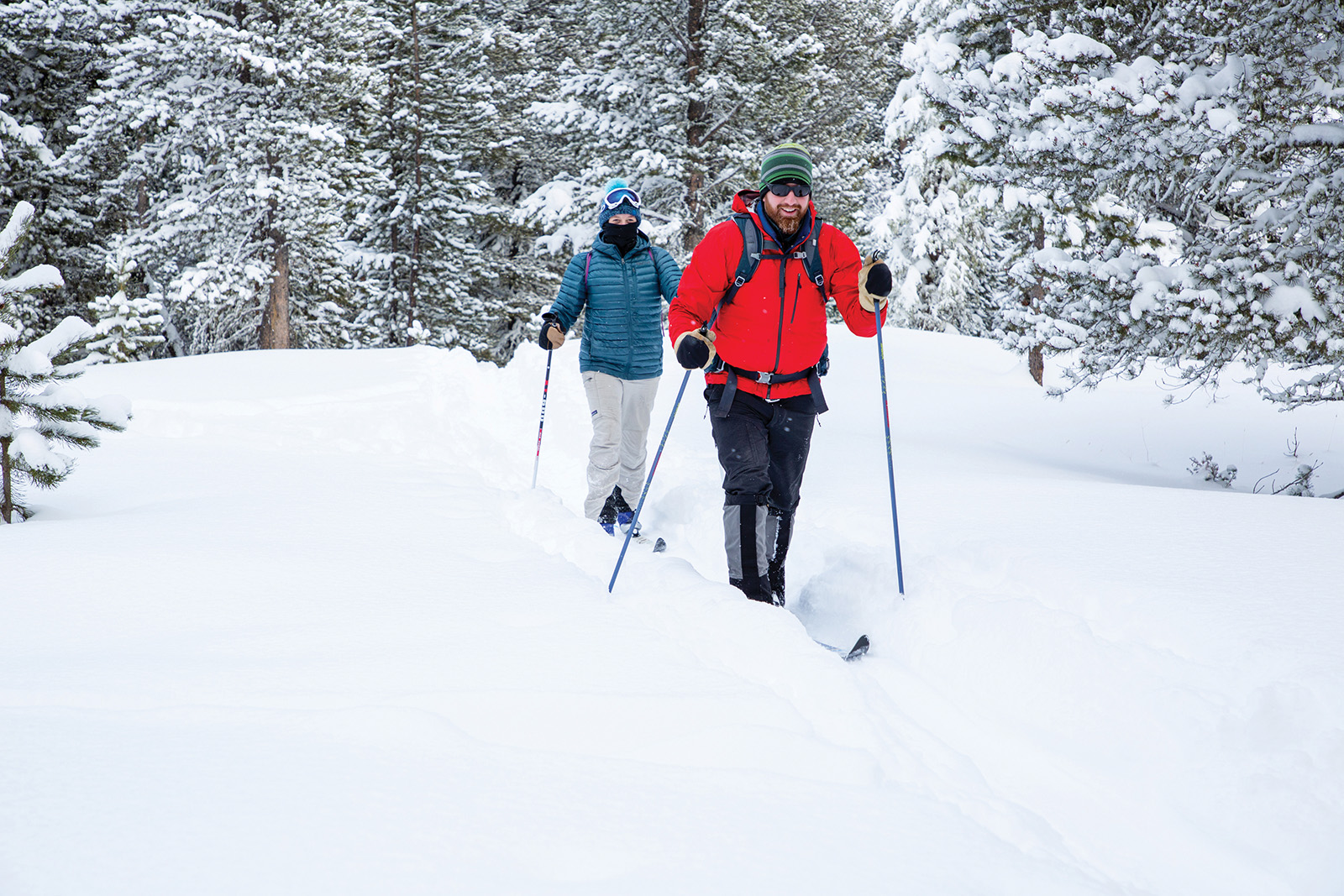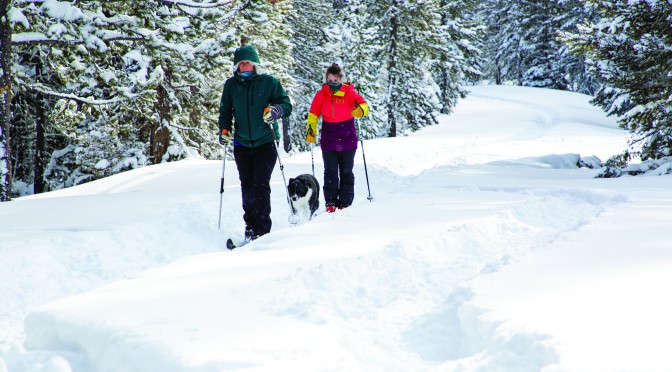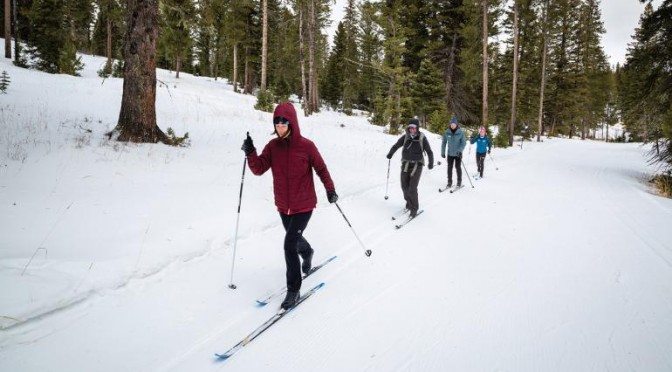Getting outside and staying fit during the warmer months is a breeze around here, but doing so in the winter is more challenging. The short days and long nights don’t make it any easier. Fortunately, Bozeman is a Nordic skier’s haven. On any given day, you’re apt to see Olympians, child prodigies, weekend warriors, and avid recreational aficionados all on the same trails. And with bountiful options both in town or just a few minutes’ drive away, getting out for a quick jaunt is easy
Classic vs. Skate
Nordic skiing can broadly be broken down into two general styles: classic and skate. The two differ in several key ways. Classic skiing is more beginner-friendly, and is done with a walk-kick technique similar to running, while skating is more of a moving duck-walk.
The skis used for each technique differ as well. Classic skis have distinct “kick” and “glide” zones on the bottoms that are waxed differently. As a lower-maintenance alternative to wax, a “fish scale” pattern on the kick section can provide traction and prevent backwards slippage.
The base of a skate ski, on the other hand, is consistent across the entire ski: coated entirely with temperature-specific glide wax that makes the entire thing slippery. Good luck “walking” with skate skis—you won’t make it far. Instead, a “skating” pattern (similar to ice skating) propels you forward.

Where to Go
Classic skiers can use both groomed and ungroomed trails, while skate skiers are limited to the former. We’ll touch on groomed trails first.
Right in town are the Sunset Hills and Highland Glen trail systems. Thanks to snowmaking and grooming operations by the Bridger Ski Foundation (BSF), these two tracks are among the first to come into shape, usually in early December. Hit them in the morning, or practice your agility on skis by navigating around gaggles of kids at afternoon ski lessons. Also in town is the Bridger Creek Golf Course. Park at the clubhouse and warm up on the flat lower loops before doing a few intervals on the upper, hillier section.
A 20-minute drive from downtown is the Sourdough Trail. This track is also groomed by BSF, but is open to shared use. Realistically, most hikers, snowshoers, and runners only make it up to “the bridge,” around mile four. Beyond that, the track is in much better shape, and continues another five miles to Mystic Lake, or over Moser Pass to the Moser trailhead up Hyalite Canyon.
Speaking of Hyalite, there are several groomed trails stemming from the main parking lot at Hyalite Reservoir. These trails snake around the lake and surrounding forests, and are groomed intermittently at best—usually just a few times per season—making them a better option for classic skiers.
For classic and skate skiers alike, Crosscut Mountain Sports Center is far and away the best locale for Bozeman-area Nordic nuts. The grooming is immaculate, with all trails being hit by the snowcat pretty much every day. Check their detailed forecast for hour-by-hour weather and snow reports.
A little farther away, and more suited for a weekend trip, are the Rendezvous Trails in West Yellowstone. These tracks are a few thousand feet higher in elevation than those around Bozeman, and are the first to load in with snow every winter. In a typical year, college Nordic teams from across the country descend on West Yellowstone over Thanksgiving for an early-winter training trip. For serious skiers looking to test their skills (and endurance), there are a couple of annual races on these trails.
For classic skiers looking to get off the beaten the old logging roads and backcountry singletrack at Brackett Creek, Goose Creek, and Bear Canyon are good options for more solitary excursions.
Etiquette
The single largest Nordic-skiing faux pas is damaging a ski track—be that snowshoeing on a singletrack or walking on a groomed trail (with the exception of Sourdough—and even then, it’s important to minimize the damage by sticking to the side of the trail). Nordic skiing on a lumpy track is no fun at all.
Additionally, don’t be a snob. Nordic skiing ain’t a cheap sport, and especially in the competitive world, it can be a touch elitist. Do your part to counter that by being friendly at the trailhead and on the trails. If someone asks you a question about wax or conditions, share what you know in a non-condescending way to encourage more participation in the sport. And on Sourdough, be nice—a friendly request to keep the dog out of the track is way better than a nasty comment as you ski past. Honey catches more flies than vinegar.
Events
Whether learning to Nordic ski or already a pro, Bozeman is the place to be a social skinny-skier.
November-March
Clinics – Bozeman. BSF offers Nordic ski clinics throughout the winter, providing an easy way to drop in and learn a few ski tips. bridgerskifoundation.org
December-February
FUNSKI Community Series – Various locations. BSF hosts one race per month during the winter, usually on weeknights. Themes range from a Santa chase to a lively two-person relay. Costumes encouraged. bridgerskifoundation.org
January-March
Biathlon Races – Crosscut. Our backyard Nordic center hosts a series of fun community biathlon races throughout the winter. crosscutmt.org
January
Hyalite Tour – Hyalite. This isn’t a race, just a great day to go ski the trails in Hyalite with friends and finish with free food & hot cocoa. Pick your distance and trail. hyalite.org
March
Yellowstone Rendezvous – West Yellowstone. A good portion of Bozeman heads to West Yellowstone each March for the final races of the season with a 2k, 5k, 10k, 25k, and 50k. skirunbikemt.com
Editor’s note: Dates are subject to change. For the most updated information, visit outsidebozeman.com/events.


